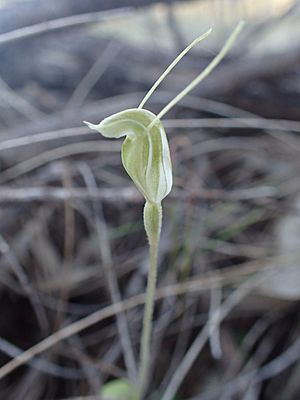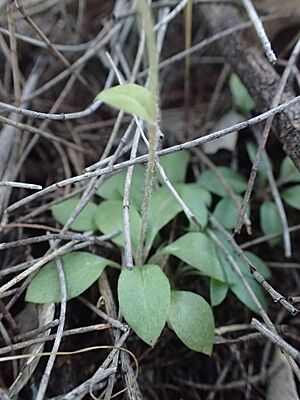Hairy-leafed snail orchid facts for kids
Quick facts for kids Hairy-leafed snail orchid |
|
|---|---|
 |
|
| Pterostylis echinulata growing in Beverley | |
| Conservation status | |
| Scientific classification |
|
| Kingdom: | Plantae |
| Clade: | Tracheophytes |
| Clade: | Angiosperms |
| Clade: | Monocots |
| Order: | Asparagales |
| Family: | Orchidaceae |
| Subfamily: | Orchidoideae |
| Tribe: | Cranichideae |
| Genus: | Pterostylis |
| Species: |
P. echinulata
|
| Binomial name | |
| Pterostylis echinulata D.L.Jones & C.J.French
|
|
| Script error: The function "autoWithCaption" does not exist. | |
Script error: No such module "Check for conflicting parameters".
The Pterostylis echinulata, also known as the hairy-leafed snail orchid, is a special type of orchid. It is found only in the south-west part of Western Australia. This means it is endemic to that area.
Both young plants and flowering plants have a group of leaves that lie flat on the ground. This group of leaves is called a rosette. When the plant flowers, it grows a single pale yellowish-green flower.
Contents
What the Hairy-Leafed Snail Orchid Looks Like
The hairy-leafed snail orchid is a plant that grows from an underground tuber. A tuber is like a small, round storage part, similar to a potato. This plant is a perennial, meaning it lives for many years. It is also a herb, which means it has soft stems, not woody ones like a tree.
The plant has a tight group of leaves, called a rosette. These leaves are about 5 to 20 millimeters (about 0.2 to 0.8 inches) wide. They lie flat on the ground.
The Flower of the Orchid
When the orchid flowers, it grows a single pale yellowish-green flower. This flower is about 9 to 11 millimeters (about 0.35 to 0.43 inches) long. It is also about 5 to 8 millimeters (about 0.2 to 0.3 inches) wide. The flower grows on a stem that is covered in tiny hairs. This stem can be 40 to 80 millimeters (about 1.6 to 3.1 inches) tall.
There is also one small leaf on the flowering stem. This leaf is about 6 to 8 millimeters long and 3 to 4 millimeters wide.
The top part of the flower, called the dorsal sepal, joins with the petals. These parts form a slightly puffed-up hood. This hood is called a "galea." It covers the central part of the flower, which is called the column. The side parts of the flower, called the lateral sepals, stay close to the hood. They almost close the front of the flower. These side parts have thin, thread-like tips that are about 14 to 17 millimeters long.
The labellum is another part of the flower. It is wide but you cannot see it from outside the flower. The hairy-leafed snail orchid usually flowers in June and July.
How the Hairy-Leafed Snail Orchid Got Its Name
The hairy-leafed snail orchid was officially described in 2014. Two botanists, David Jones and Christopher French, gave it its scientific name. They wrote about it in a magazine called Australian Orchid Review.
Before 2014, people knew this orchid as Pterostylis sp. 'hairy leaf'. The scientific name echinulata comes from a Latin word. It means "with very small prickles." This name was chosen because the leaves, stem, and other parts of the plant have tiny, prickly-looking cells.
Where the Hairy-Leafed Snail Orchid Lives
The hairy-leafed snail orchid grows in open woodlands. It likes to grow under small shrubs. You can find it in an area called the Mallee biogeographic region. This region is known for its unique plants and landscapes.
Protecting the Hairy-Leafed Snail Orchid
The Western Australian Government's Department of Parks and Wildlife has given the Pterostylis echinulata a special protection status. It is classified as "Priority One".
This means that the orchid is only found in one or a few places. These places could be at risk. Because of this, the plant needs special care to protect it and make sure it continues to grow.



